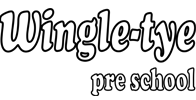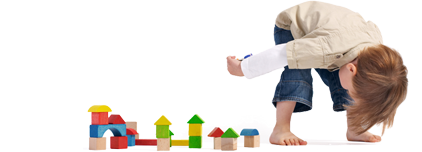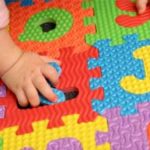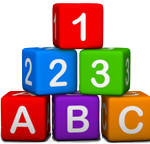EDUCATION PROGRAMME
Wingle-Tye follows the framework for learning, development and care of children – The Early Years Foundation Stage. Children learn through play. Play allows them to understand the world around them and also helps them to develop both socially and emotionally.
The curriculum allows children to develop and learn through quality play, which is child led. We have a large range of toys and materials, which will enhance the children’s learning in a creative and challenging environment. Our practitioners will introduce learning through your children’s interests at their own pace. This enables them to all reach their full potential.
As stated in the Development Matters in the Early Years Foundation Stage 2012 Government document, “The ways in which the child engages with other people and the environment … underpins learning and development across all areas, and supports the child to remain an effective and motivated learner.”
By understanding that every child is unique, Wingle-Tye encourages the child’s
engagement in play and exploration;
active learning through motivation; and
ability to create and think critically.
Wingle-Tye has been inspected by OFSTED.
The quality and standards of the nursery education and care are GOOD.
Early learning goals are organised into the following areas:
Personal, social and emotional development
Children will be provided with experiences and support to enable them to develop a positive sense of themselves. Constructive relationships will be established to take account of differences and different needs and expectations. Children will be positively encouraged with practitioners acting as positive role models and opportunities will be created for children to work alone and in small and large groups.
Children will be allowed to develop their own interests and activities will be made available to promote educational, moral, spiritual and social development, together with promoting autonomy and the disposition to learn. Children’s thinking will be challenged and they will be helped to embrace differences in gender, ethnicity, religion, special educational needs and disabilities. Children’s religious beliefs and cultural backgrounds will be acknowledged and play and learning opportunities will be provided.
Children will be encouraged to become increasingly independent in selecting activities, dressing and their personal hygiene. Children will be provided with support to achieve successful social and emotional development. Children will be encouraged to develop respect for others, to develop social skills and learn how to manage feelings – whilst also understanding appropriate behaviour in groups and gaining confidence in their own abilities.
Communication, language
Children will be provided with opportunities to communicate thoughts, ideas and feelings and to build up relationships with adults and each other. Communication and language will be incorporated in activities in each area of learning. Opportunities will be created to share and enjoy a wide range of rhymes, music, songs, poetry, stories etc., together with linking language with physical movement, role play and practical experiences.
The environment will reflect the importance of language through signs, notices and books. and opportunities will be created for children to develop their confidence and skills in expressing themselves and to speak and listen in a range of situations. Attention will be paid to identifying and responding to any difficulties in children’s language development, working closely with other professionals.
Physical development
Children will be encouraged to develop skills of co-ordination, control, manipulation and movement, by providing opportunities to be active and interactive.
They will be encouraged to gain confidence in what they do and to feel the positive benefits of being healthy and active. Challenges will be created and resources will be made available to support specific skills.
The language of movement will be introduced alongside their actions and time and opportunities will be made available for children with physical disabilities or motor impairments to develop their physical skills, working with other professionals as necessary. Children will be helped to understand the importance of physical activity and to make healthy choices in relation to food.
Literacy development
Children will be encouraged to link sounds and letters and to begin to read and write. Children will be given access to a wide range of reading materials (books, poems, and other written materials) to ignite their interest.
The environment will reflect the importance of literacy through signs, notices and books and opportunities will be created for children to experiment with writing and children will be made aware of languages and writing systems other than English.
Mathematics
This area of learning includes providing children with opportunities to develop and improve their skills in counting, sorting, matching, seeking patterns, making connections, recognising relationships and working with numbers, and calculating simple addition and subtraction problems. Children will be encouraged to describe shapes, spaces and measures. Mathematical understanding will be developed through stories, songs, games and imaginative play so that children enjoy using and experimenting with numbers.
Understanding of the world
Children will be encouraged to develop the crucial knowledge, skills and understanding that will help them to make sense of their physical world and their community, which will form the foundation for later work in sciences, design and technology, history, geography and information and communication technology. Children will be guided to explore, observe, and find out about people, places, technology and the environment. Children will be encouraged to participate in a wide range of activities that will stimulate their interest and curiosity, including the use of ICT.
Expressive arts and design
A stimulating environment will be made available in which children will be able to explore and play with a wide range of media and materials, as well as providing opportunities and encouragement for sharing their thoughts, ideas and feelings through a variety of activities in art, music, movement, dance, role-play, and design and technology. Activities will allow children to respond using their senses and opportunities will be created to explore and develop their ideas.
Records will be made of our children’s attainment and progress. Reports will be made available to parents on a regular basis. We operate a keyperson system whereby one fully trained member of staff is responsible for monitoring the progress of their allocated children. Parent/keyperson interviews are arranged throughout the year.
OUTDOOR PLAY
Wingle-Tye recognises the importance of outdoor play and ensures that activities and experiences are planned to include the oudoor area, where sensory awareness can be encouraged and explored. Outdoors is used in all weathers with staff ensuring the safety of your children at all times.



